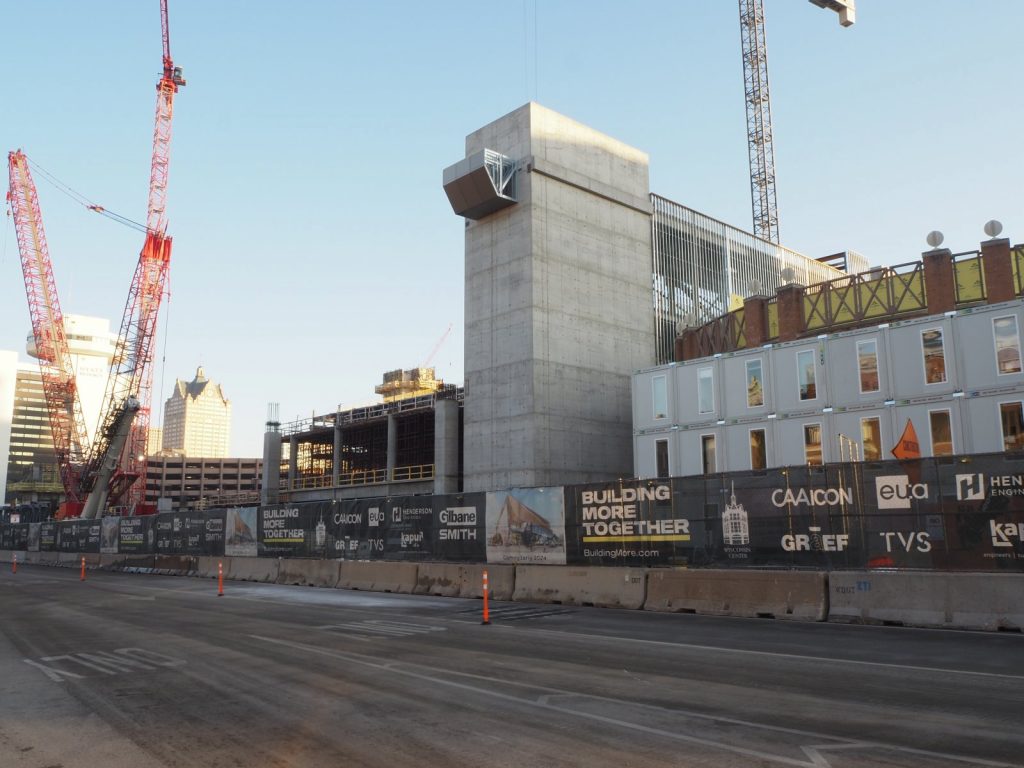41% of Milwaukee Workers Have ‘Bad’ Jobs
Study: 100,000 workers in city earn less than $15 per hour, often with no health coverage.
Once upon a time Milwaukee was a leader in pay for workers. As recently as the 1970s the city was still a vibrant manufacturing center where workers were well-paid and Black workers earned wages that exceeded the national averages for Black employees.
But as a recent study by the Center on Wisconsin Strategy (COWS) has found, it’s now normal in Milwaukee to hold jobs that don’t pay a living wage or offer health insurance. Of about 243,000 jobs in the city of Milwaukee, about 100,000 or 41% are bad jobs that pay less than $15 an hour, often don’t provide health coverage (47% of these workers don’t get health insurance) and are frequently not full-time positions (the average work week for these 100,000 workers is 34 hours).
These kind of jobs are held by a wide swath of city residents, including 31% of white workers, 51% of Black workers and 56% of Hispanic workers in the city. Laura Dresser, Associate Director of COWS, estimates that slightly more than half of the 100,000 bad jobs are held by white workers.
Back in 1979, the study found, 40% of city jobs were in manufacturing, which typically paid middle-class wages. By 2019 that had dropped to just 12% of jobs.
In 24% of workers were union members in 1979; by 2019 that had dropped to just 12% of workers.
These trends have transformed a city that was once better than average for Black workers to a place that has one of the largest racial wage gaps. In 1979, the new study found, Black workers in this city made 40% less than white workers; by 2019 that had grown to a 60% income gap.
And this was not because of a growth in the average white pay which was nearly flat over that 50 year period: it was almost entirely because real wages by Black city workers dropped so drastically over this period, from $42,134 to $29,655.
“Milwaukee has become a center of low-wage workers,” says Peter Rickman, President of MASH, the Milwaukee Area Service and Hospitality Workers Organization, which partnered on the study. “It was once one of the best for wage levels.”
Many of these bad jobs are held by “janitors. waiters, dishwashers, clerks, bussers and security guards,” the study notes.
Three occupations account for 20,000 of the bad jobs: Food service ($10.99 per hour average pay), janitors ($12.26) and security guards ($12.92).
These are not just young people working at restaurants or retail jobs until they get a better job; this is a way of life for most of these workers. The study found the average age of the 100,000 people holding bad jobs was 30 years old, compared to 42 years old for the 142,000 workers with better jobs.
One obvious solution would be to raise the minimum wage. A 2021 study by the Economic Policy Institute found a $15 minimum wage would help hike wages for 831,000 workers in Wisconsin, including 38% of the workers in Milwaukee County.
By 2022 30 states had raised their minimum wage above the federal requirement, including seven red states. Four states and District of Columbia have hiked the minimum to at least $15. A Marquette University Law School poll in 2019 found 55% of voters support increasing it and just 39% oppose this. And as Urban Milwaukee’s Data Wonk has reported, real-world research shows a $15 minimum wage results in few lost jobs and huge benefits for workers. Yet Wisconsin’s Republican-controlled Legislature staunchly opposes any increase in the minimum wage of $7.25, much less raising it to $15.
The COWS study argues that unionization of service jobs is needed in Milwaukee. Rickman notes that “one in five Milwaukee workers is employed in service and hospitality jobs. You can’t transform the city unless these become living-wage union jobs.”
MASH had success with the Milwaukee Bucks and Fiserv Forum, creating union jobs for 1000 workers, including “cooks and cashiers, bartenders and baristas, servers and security guards,” Rickman notes, which “establishes a blueprint for the kind of jobs you find all across Milwaukee.”
But the Bucks and and Fiserv Forum are heavily subsidized by the taxpayers. Extending that to non-subsidized businesses presents an obvious challenge. MASH and COWS did an earlier study proactively noting that if the proposed Iron District gets a tax subsidy for its planned soccer stadium, something Gov. Tony Evers has pushed, then the Fiserv Forum deal for workers should be required there. Such deals are common at other subsidized soccer stadiums, he says.
Rickman also points to the huge taxpayer investment in the expansion of the downtown convention center, which will benefit nearby hotels with spinoff bookings. “There are a bunch of hotel workers who are going to be employed as a result. What will Milwaukee do to make sure they get a living wage?”
“We need to have everyone at the table, the hotels in the area, city and Wisconsin Center District officials and representatives of workers to talk about this.”
The reality is the once booming manufacturing city is now more of a service economy and “improving those now abundant service jobs is essential to to securing a stronger and more equal Milwaukee,” the study warns.
Murphy's Law
-
National Media Discovers Mayor Johnson
 Jul 16th, 2024 by Bruce Murphy
Jul 16th, 2024 by Bruce Murphy
-
Milwaukee Arts Groups in Big Trouble
 Jul 10th, 2024 by Bruce Murphy
Jul 10th, 2024 by Bruce Murphy
-
The Plague of Rising Health Care Costs
 Jul 8th, 2024 by Bruce Murphy
Jul 8th, 2024 by Bruce Murphy























I think the real issue is the incompetent leadership of the city that has failed to protect and educate its citizens. If businesses don’t feel safe in the city they wont invest here bringing higher paying jobs. Additionally while looking at MPS test scores and statistics it has become obvious that the current school system is not currently supplying a large percentage of highly skilled graduates. Starting over or breaking up this failed system is most likely a better option to increase average pay for our citizens than installing an arbitrary artificial floor to wages. Once we have developed those skills and workers who in demand wages generally follow in most studies.